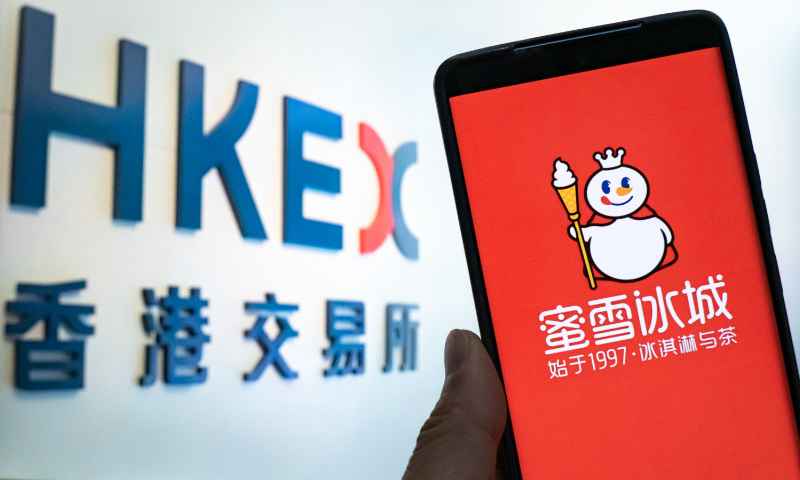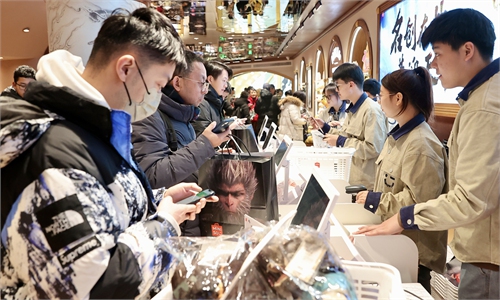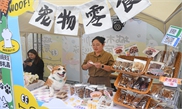Shares of China tea drink chain Mixue Group jump in HK trading debut; reflects growing capacity of county-level consumption: expert
Firm devt reflects growing capacity of county-level consumption: expert

China's tea drink maker Mixue Group starts trading on the Hong Kong Stock Exchange on March 3, 2025. Photo: VCG
China's tea drink maker Mixue Group saw its shares jump 43.21 percent on the first day of trading on the Hong Kong Stock Exchange on Monday, with its market value exceeding HK$100 billion ($12.86 billion).
The company is among a number of China's bubble tea makers that seek a listing on the stock markets. The rapid development of these companies, which mainly targeted consumers in second- and third-tier cities, also demonstrated the growing capacity of county-level consumption, a Chinese expert said.
Mixue sold 17 million shares at a fixed price of HK$202.5 each. The shares started trading at HK$262 and closed at HK$298. Retail investors subscribed for 5,258 times more shares than were on offer in that tranche, according to Mixue's filings, making it one of Hong Kong's most popular ever IPOs.
"The rise of Mixue's shares showed the market's confidence in the company's brand strength with a large network of stores and a broad consumer base that mainly targets third-tier cities. Mixue's profitability also provides investors with confidence," Wang Peng, an associate research fellow at the Beijing Academy of Social Sciences, told the Global Times on Monday.
According to Mixue's filings, the company's revenue reached 18.7 billion yuan ($2.57 billion) from January to September 2024, up 21.2 percent year-on-year. Net income totaled 3.5 billion yuan, representing 42.3 percent growth. As of September 30, 2024, Mixue had 40,510 stores in the Chinese mainland, of which 23,162 were located in third-tier cities, accounting for 57.2 percent.
Wang noted that in addition to its complete supply chain and brand influence, the company has seized the development opportunity of the county-level consumption market, which has shown great potential with the country's stable economic development and accelerated urbanization.
Another China bubble tea maker Guming was listed on the Hong Kong Stock Exchange on February 12, the first new listing in Hong Kong at the beginning of the Year of the Snake. Guming's listing has attracted a lot of capital and attention, with a subscription rate of 194.87 times for the public offering and 15.03 times for the international offering.
As of November 30, 2024, the number of Guming's stores stood at 9,823 nationwide. Among them, 80 percent were located in second-tier cities, and 40 percent were located in townships and villages therein, according to media reports.
"The listings of Mixue and Guming represent not only a milestone of brand capitalization, but also a sign of the shift from 'potential' to 'strength' in China's county-level consumer market," Wang said.
With the continuous improvement of the county-level business system and the steady increase in the income level of farmers, the county-level consumer market has shown strong vitality. Data released by China's Ministry of Commerce showed that retail sales in villages amounted to 6.67 trillion yuan in 2024, an increase of 4.3 percent, which was a growth rate of 0.9 percentage points faster than in townships and cities.
The county- and township-level market has kept on expanding, with retail sales in towns and rural areas accounting for 38.8 percent of China's total retail sales in 2024, up by 0.4 percentage points from a year earlier, according to the National Bureau of Statistics.
Moreover, major retail giants have actively expanded their operations to cover small cities and townships in recent years, including hotpot chain Haidilao, KFC and others. For example, KFC started exploring the "small town model" in 2020, and since May 2024, it has beefed up efforts to expand to many townships.
According to Yum China's financial report, KFC expanded to over 2,200 Chinese cities and townships in 2024, bringing its total outlets to 11,648 across the country.
In recent years, national and local governments have introduced policies and measures to support the development of the county-level economy and the development of its consumer market.
In July 2023, the Ministry of Commerce and eight other departments released a three-year action plan to strengthen county-level commerce. In 2024, China upgraded 5,856 county and township commercial centers and 53,000 village-level convenience stores, according to the ministry.
Wang noted that with the improvement of commercial infrastructure in counties including cold chain logistics and digital payments and the rise of residents' incomes, consumption potential will be further released, and the county-level market is becoming a new engine of the country's consumption growth, as the listing of tea drink brands is just the beginning of this trend.



